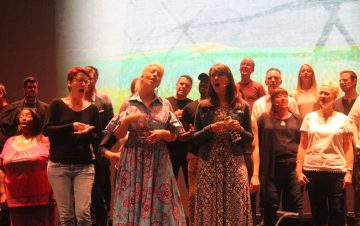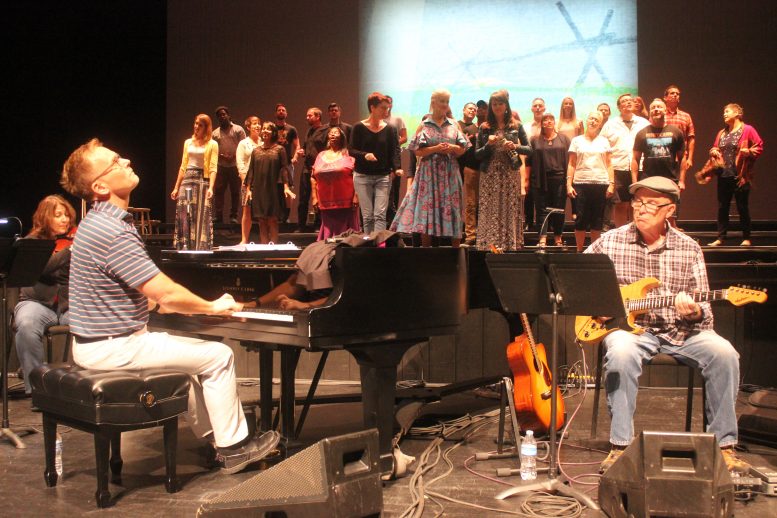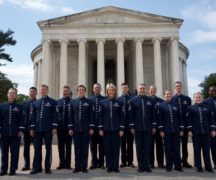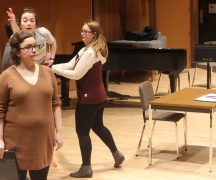By DAVID DUPONT
BG Independent News
“Considering Matthew Shepard” ended in silence.
A packed Kobacker Hall went quiet as the C-triad softly hummed by the members of the vocal ensemble Conspirare and the 100 singers filling the mezzanine faded out. At first it seemed the usual pause at the end of a concert.
But the silence extended in length, and somehow increased in depth.
The conductor-composer Craig Hella Johnson stood in front of the stage head bowed. Silence.
Then his head rose and his gestured to the performers on stage. The audience erupted. The applause rapturous, as loud as the previous moments were soft.
On their feet, the audience called the ensemble out for three curtain calls.
The applause did not so much break the silence as let loose the emotions it contained.
The listeners and performers had for the past 100 minutes lived the story of Matthew Shepard, a young gay man beaten and left for dead in October 1998 outside of Laramie, Wyoming. When he died several days later he became an icon for those who opposed hate crimes and longed for greater tolerance.
The oratorio was performed Monday by Conspirare at Bowling Green State University.

Conspirare singers rehearse “Considering Matt Shepard” Monday.
When, a few minutes after the performance ended, about 150 members of the audience assembled in Bryan Recital Hall, members of the panel who were there to discuss the work and the meaning of Matthew Shepard, said it was hard to speak about the experience.
Katie Stygles, assistant director for Diversity Education and LGBTQ+ Programs at Bowling Green State University, said she was still processing the experience. “I still have tears flowing over. It’s just so beautiful.”
She sees the students she serves in Matthew Shepard.
Susana Pena, director, School of Cultural and Critical Studies, said that when the news of Shepard’s death came, the nation had reached a point where it was open to hearing this tragic story, and acting on it.
Olivia Behm, a graduate student, said she grew up in the world shaped by Shepard’s death. “Considering Matthew Shepard,” she said, was more than research into the facts, but allowed her to be emotionally absorbed in the story.
The oratorio had plenty of facts, drawn from court documents and news reports. It included Shepard’s own words from journals and childhood jottings. It also had long passages of reflection.
Johnson composed the piece over a long period of time, drawing on various texts, and in several instances collaborating with poet Michael Dennis Browne, credited as co-librettist.
Johnson’s discovery of another poet’s work gave him the guiding image for the piece. Leslea Newman wrote a series of poems from the point of view of the fence on which Shepard was tied and left to die. He hung there for 18 hours barely alive before he was discovered. The man who found him at first thought he was a scarecrow.
Those pieces form the skeleton of “Considering Matthew Shepard.” The first poem “The Fence (before),’ a robust bass solo, prefigures Shepard’s fate. “Will I always be out here exposed and alone?”
Later in the oratorio, we hear the speech Shepard’s father gave in court. His son, the father said, was not alone. He had the stars and moon, which he’d studied as a child. He had the wind from the plains. The smell of the Wyoming landscape that he loved.
These natural elements serve as the backdrop with images of Wyoming scenery projected on a screen behind the singers.
The music seemed to rise from those fields. Johnson said he wanted the music to be accessible. He wanted to write a piece that would be appreciated by listeners in his home on Minnesota’s Iron Range. Yet, he said, he wanted it to have a structure that could be appreciated by his musical peers and be demanding enough to reward the performers.
He opened with a silly bit of cowboy song, a bit that returned at the end. He had a country ballad and blues shout. Conspirare has singers in its ranks who are at home in those styles. And the 30 voices had plenty of opportunity to join together in anthems deeply rooted in the American choral tradition.
In the talk back, one piece was singled out. “I Am Like You” forces the listener to consider how they are like Aaron McKinney and Russell Henderson, the two men who killed Shepard and are now serving life sentences in prison.
The piece has a spare, chanting quality. It evokes the work of David Lang who has also written a contemporary work based on Bach’s Passions.
The individual lines are simple and bell-like, but Johnson sustains them until they collide, letting the dissonance ring.
In composing, he said, he felt there was something missing. He needed another dimension, to see the story from another angle. This was it. And he knew he needed to write these words himself because they resounded from so deep within his psyche.
“Considering Matthew Shepard” climaxed with a chorale that evoked Bach. Johnson said it was hard to escape his Lutheran upbringing.
On “All of Us” the mass of singers from Bowling Green High School, BGSU, and the University of Toledo, came to their feet, and raised their voices in a hymn of hope. The only way to move forward was through love, a love shared by all of us.
Then came a short reprise of “This Chant of Life” and that cowboy ditty, all resolving on the simple chord. Then silence like on that empty plain in Wyoming.





